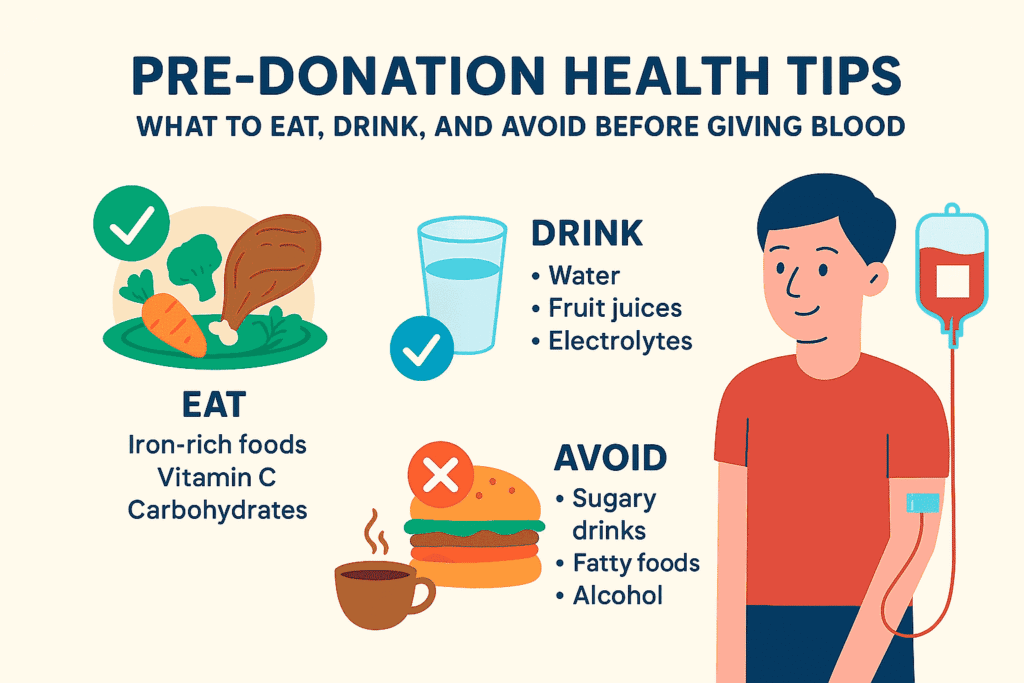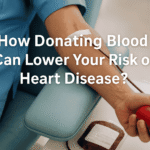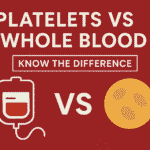Donating blood is one of the simplest and most powerful ways to save lives. Every unit of blood can help up to three patients in need, from accident victims to those battling chronic illnesses. However, before you roll up your sleeves, it’s important to prepare your body properly. Knowing what to eat, drink, and avoid before donating blood can make your experience smoother, safer, and more effective — both for you and for the recipient.
What to Eat Before Donating Blood
A healthy diet before donation ensures that your body maintains proper iron levels and stable energy throughout the process. Ideally, start preparing one or two days before your donation.
1. Iron-Rich Foods
Iron helps produce hemoglobin — the oxygen-carrying component of your blood. A low iron level is one of the most common reasons donors are deferred.
Include:
-
Green leafy vegetables (spinach, kale, amaranth)
-
Lentils, beans, chickpeas
-
Lean meats like chicken or fish
-
Fortified cereals and oats
2. Foods High in Vitamin C
Vitamin C boosts your body’s ability to absorb iron.
Include:
-
Citrus fruits (oranges, lemons)
-
Tomatoes, bell peppers, strawberries, guava
3. Healthy Carbohydrates
Carbs give your body the quick energy it needs during and after donation.
Include:
-
Whole-grain bread, brown rice, or fruits like bananas and apples
4. Light, Balanced Meal
Eat a light meal about 2–3 hours before your appointment. Avoid donating blood on an empty stomach — it can lead to dizziness or fatigue.
What to Drink Before Donating Blood
Hydration plays a key role in maintaining blood volume and preventing weakness.
1. Drink Plenty of Water
Aim for 2–3 extra glasses of water the day before and the day of your donation. Proper hydration makes veins more visible and the process faster.
2. Fruit Juices and Electrolytes
Fresh fruit juices, coconut water, and electrolyte drinks help keep your body’s salt and fluid balance in check.
3. Avoid Alcohol & Caffeine
Alcohol dehydrates your body, while excessive caffeine can constrict your blood vessels — making the donation harder and recovery slower.
What to Avoid Before Donating Blood
Being mindful of what not to consume is just as important as what you do eat.
1. Fatty or Greasy Foods
Burgers, fries, or oily snacks can interfere with the testing of your blood after donation. Keep your pre-donation meal light and nutritious.
2. Iron-Blocking Substances
Avoid drinking tea or coffee immediately before your donation — they contain tannins that reduce iron absorption.
3. Smoking and Alcohol
Avoid smoking for at least 2 hours before and 24 hours after donating blood. Skip alcohol for a full 24 hours before and after donation.
4. Heavy Workouts
Don’t hit the gym or do intense exercise right before donating. Rest well and stay calm — your body needs steady energy.
Bonus Tip: Rest & Relax
A good night’s sleep before your donation helps your body stay balanced. Arrive relaxed, wear comfortable clothes with sleeves that roll up easily, and don’t skip breakfast or your meal.
In Conclusion
Donating blood is a selfless act of compassion — but taking care of your own health ensures you can keep doing it safely. By focusing on iron-rich foods, proper hydration, and a balanced lifestyle, you not only help save others’ lives but also support your own well-being.
Every drop counts, and every healthy donor makes a difference.
Be prepared. Be healthy. Be a BloodSaathi.


